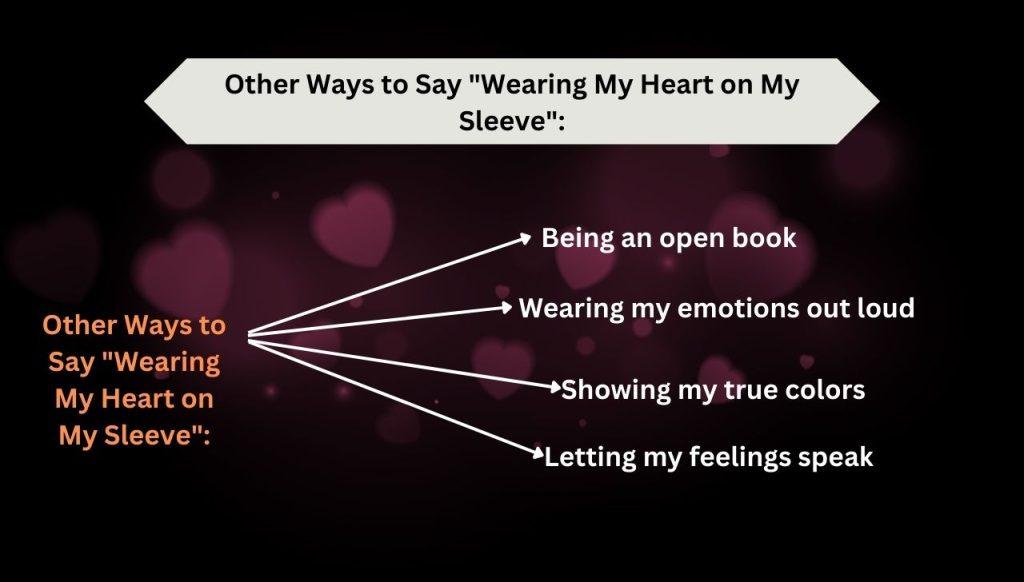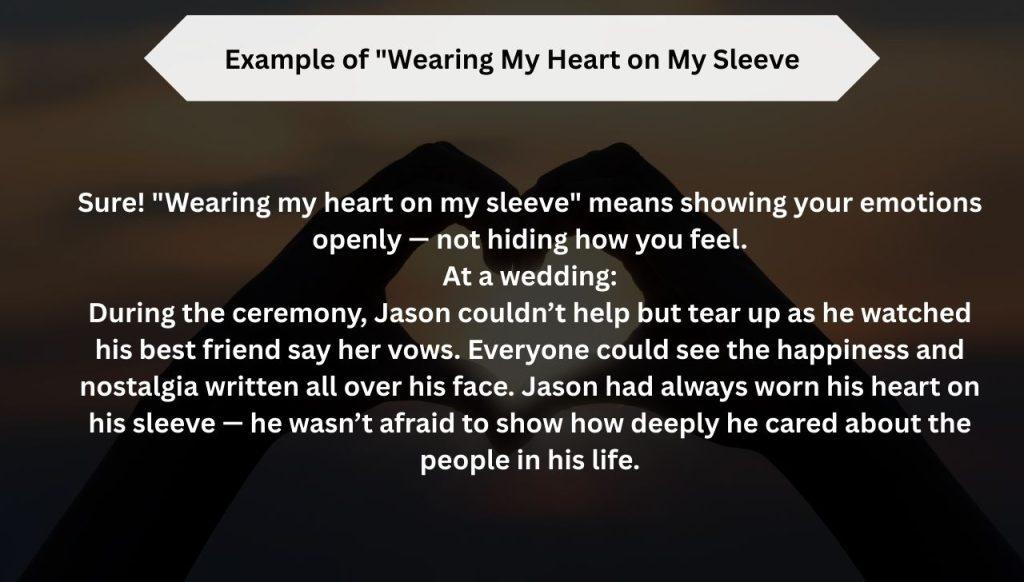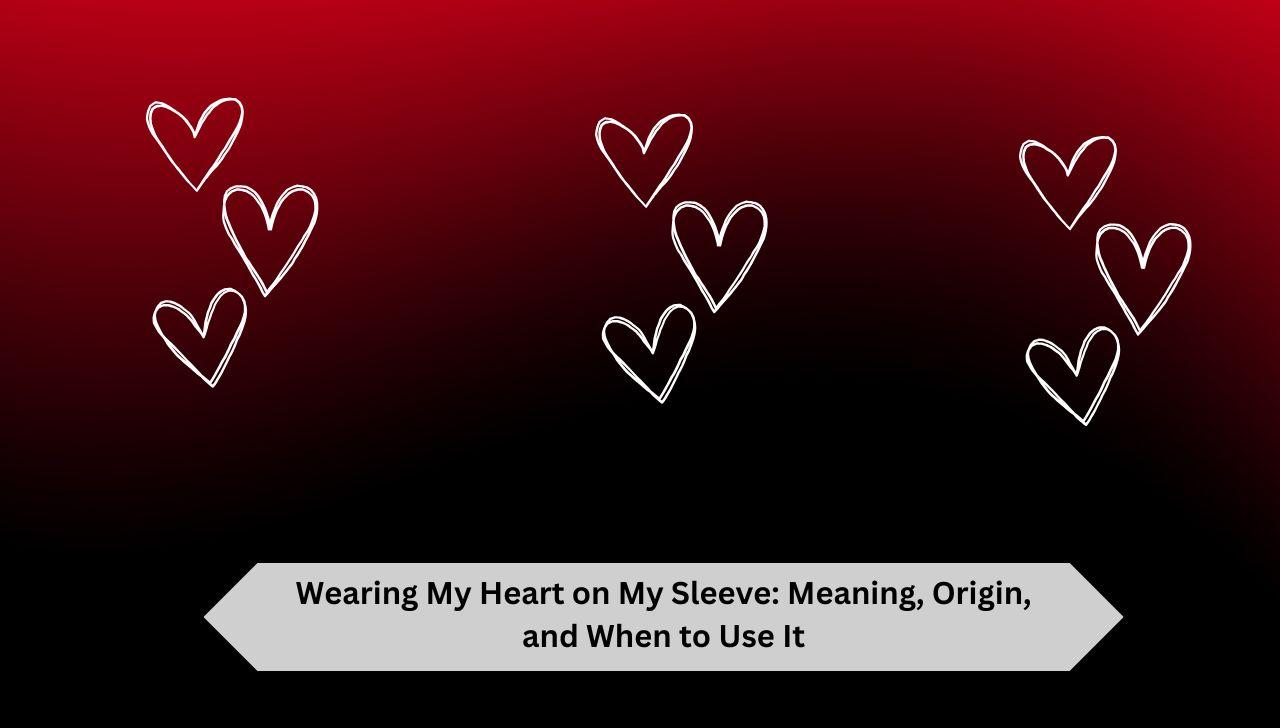Wearing My Heart on My Sleeve: Meaning, Origin, and When to Use It
The phrase “wearing my heart on my sleeve” means being open about one’s feelings. It describes people who show their emotions clearly and don’t hide them. This kind of openness is sometimes praised for being honest and real. However, it can also leave someone open to getting hurt emotionally.
In different situations—like with friends, at work, or in art—showing emotions freely has its ups and downs. Understanding this phrase is essential because it helps us see more about how people handle and share their feelings. It shows us something true about everyone: dealing with and showing our emotions can be complicated.

Other Ways to Say “Wearing My Heart on My Sleeve”:
Showing emotions openly can sometimes feel vulnerable. But there are many ways to express your feelings without hiding behind walls. This section explores various phrases that capture the essence of letting your heart show without reservation.
| Phrase | Meaning |
|---|---|
| Being an open book | Being open and honest about your feelings and thoughts. |
| Wearing my emotions out loud | Expressing emotions openly and clearly. |
| Showing my true colors | Revealing your authentic self, without pretending. |
| Letting my feelings speak | Allowing your emotions to guide your actions or words. |
| Wearing my soul on my sleeve | Being emotionally vulnerable and open. |
| Not hiding my emotions | Not concealing or suppressing your feelings. |
| Putting it all out there | Sharing everything without holding back. |
| Speaking from the heart | Expressing genuine, heartfelt emotions. |
| Showing my inner self | Revealing your true personality and emotions. |
| Letting my heart do the talking | Allowing your emotions to guide what you express. |
| Revealing my heart’s truth | Sharing your most personal and honest emotions. |
| Exposing my feelings | Making your emotions visible and open to others. |
| Living with my heart exposed | Leading a life where you are emotionally open and vulnerable. |
| Putting my heart in the open | Being emotionally transparent and unafraid to show emotions. |
| Letting my heart lead | Allowing your emotions to guide your actions and decisions. |
| Being emotionally transparent | Being open and honest about your feelings without hiding them. |
| Wearing my truth | Expressing your authentic feelings and beliefs. |
| Openly expressing myself | Sharing your thoughts, feelings, and opinions openly. |
| Allowing my heart to show | Letting your emotions and true feelings be visible. |
| Letting my feelings shine through | Allowing your emotions to be clearly visible to others. |
What Does “Wearing My Heart on My Sleeve” Mean?
Wearing your heart on your sleeve means showing your emotions openly, clearly showing how you genuinely feel. This phrase suggests honesty and vulnerability, indicating that someone isn’t hiding their emotions. Typically, it means you’re ready to share your feelings of love, sadness, or honesty without holding back or worrying about others’ judgments.
Being this open with emotions is similar to a two-sided coin: it can deepen trust and closeness in relationships, but it can also leave you open to hurt if others do not respond in kind or take advantage of your openness.

Example of “Wearing My Heart on My Sleeve
Sure! “Wearing my heart on my sleeve” means showing your emotions openly — not hiding how you feel.
At a wedding:
During the ceremony, Jason couldn’t help but tear up as he watched his best friend say her vows. Everyone could see the happiness and nostalgia written all over his face. Jason had always worn his heart on his sleeve — he wasn’t afraid to show how deeply he cared about the people in his life.
The Origin of the Phrase: Historical and Literary Roots
Understanding the origin of “wearing my heart on my sleeve” can deepen its significance. This phrase, which means being open about one’s feelings, originated in medieval times during jousts. Knights would display a lady’s favor, like a scarf, on their arm as a sign of affection and loyalty in these tournaments. This act of showing feelings publicly became linked to the phrase.
William Shakespeare later embedded this expression in our language through his play “Othello.” In the play, Iago claims he wears his heart on his sleeve, although he is being deceptive. This use by Shakespeare gives the phrase layers of meaning, suggesting openness and the potential for manipulation.
The Psychological Impact of Being Open with Your Emotions
Being open about your emotions can lighten your load. Hiding what you feel takes a lot of energy and can keep you on edge. When you share your genuine feelings, you often find support and understanding from others, creating a sense of community.
However, there’s a flip side. Being open might also lead to rejection or misunderstandings. From a psychological standpoint, honestly sharing your emotions can make you more self-aware and authentic. It helps you deal with your feelings better. Knowing yourself deeply is essential for growth and handling life’s ups and downs with more confidence.
The Pros and Cons of Wearing Your Heart on Your Sleeve
Being open with your emotions, or wearing your heart on your sleeve, has its ups and downs. It’s good because it helps build deeper connections and trust. When you’re open about your feelings, people see you as honest and approachable, which makes it easier to develop close relationships.
However, being this open has its risks. You might get hurt or taken advantage of if you show your emotions too freely. Some people might use your honesty against you. Also, in a work setting, being too emotional can sometimes look unprofessional and might hurt your career or work relationships.
When It’s Best to Wear Your Heart on Your Sleeve (and When Not To)
When is it good to show your emotions freely, and when might it be better to keep them under wraps? Sharing your feelings can strengthen trust and strengthen bonds, especially with friends or family who appreciate honesty.
But, in work settings or when you’re negotiating, showing too much emotion might be seen as a weak spot. It could make others doubt your leadership or weaken your negotiation stance. In situations full of tension or uncertainty, playing it cool often helps. Before deciding to share your feelings or keep them to yourself, think about the emotional tone of the situation and how being open might affect your objectives and relationships.
Similar Phrases That Convey Vulnerability
Several expressions like “wearing your heart on your sleeve” capture being open about one’s feelings. Take the phrase “opening up one’s heart.” It means sharing your deepest emotions freely, even though it might leave you feeling exposed.
Then there’s “laying one’s cards on the table,” which comes from card games. It’s about being upfront and honest, showing what you’ve got. Another term, “baring one’s soul,” suggests sharing your innermost thoughts and feelings completely. Each phrase points to our ability to be open about our emotions, despite the risk of getting hurt or misunderstood. It shows a strong sense of self to share so openly.
Conclusion
Understanding the phrase “wearing your heart on your sleeve” sheds light on human emotion and communication complexities. This expression enriches our language and helps us grasp how being open with our feelings can affect our relationships with others.
It reminds us that showing our true feelings can make us vulnerable, but it can also be a strength, depending on the situation and how mature we are emotionally.







